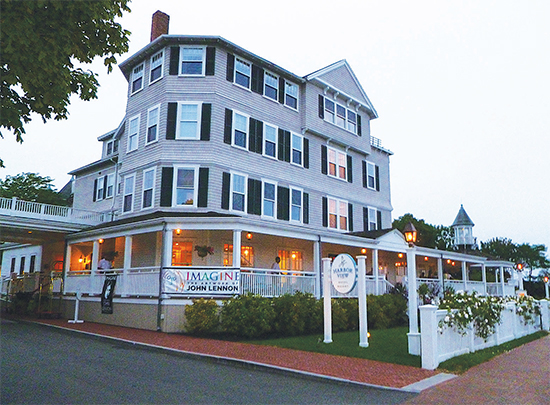 Lack of Notification Used as Basis for Appeal
Lack of Notification Used as Basis for Appeal
By Christopher R. Vaccaro
Special to Banker & Tradesman
An Edgartown hotel’s relocation of its outdoor pool bar is stirring up a hornet’s nest of litigation on Martha’s Vineyard.
The Harbor View Hotel has served vacationers since 1891. Under zoning law, the hotel is a legal nonconforming commercial use in a residential district. The Edgartown Zoning Board of Appeals originally granted the hotel a special permit to serve food and beverages at an outdoor pool bar in 1992.
Years later, the hotel applied for a special permit to relocate the pool bar. The hotel received this special permit in May 2019 and started work in June, after expiration of the 20-day appeal period for special permits and zoning variances.
Neighbors Fight on Two Fronts
Upon becoming aware of the work in progress, the hotel’s neighbors filed two lawsuits against the hotel and the ZBA in Dukes County Superior Court to annul the special permit. The neighbors claimed that they were not notified of the ZBA hearing.

The Massachusetts Zoning Act allows “persons aggrieved” – persons likely to suffer harm because of a zoning decision – to appeal the decision on the merits within 20 days after the decision is filed with the municipal clerk. It also gives abutters a 90-day appeal period if the municipality fails to properly notify them of the zoning hearing. The hotel’s neighbors filed their lawsuits within the 90-day period.
The ZBA and the hotel sought dismissal of both lawsuits, relying on the zoning administrator’s sworn statement that she mailed notices of the ZBA hearing to the neighbors. The neighbors produced their own sworn statements that they never received the notices. The Superior Court judge accepted the zoning administrator’s statement, discredited the neighbors’ statements, and dismissed the lawsuits in November 2019.
Meanwhile, the neighbors requested that the Edgartown building inspector shut down the new pool bar, claiming that it was outside the pool area and not authorized to serve food and beverages. The building inspector denied their request and the ZBA upheld that denial, whereupon the neighbors filed a third lawsuit. The Superior Court dismissed that lawsuit in April 2020, concluding that it was an improper effort to appeal the court’s dismissal of the prior lawsuits.
The neighbors appealed the Superior Court’s decisions, and applied more pressure on the hotel. Because of construction delays caused by a fire and the COVID pandemic, the hotel applied to the ZBA for a modification of a different special permit, involving the hotel’s guest rooms, ballroom and spa. The ZBA referred that application to the Martha’s Vineyard Commission (MVC), a regional planning commission. The MVC voted to hold a public hearing on the hotel’s application.
Dispute Moves to Regional Commission
The MVC opened the public hearing in January 2021. The neighbors contested the hotel’s application, citing potential negative impacts from noise, traffic, parking and other matters. Months later, the MVC approved the hotel’s application, but imposed several conditions, including requirements that the hotel seek MVC approval of any increases to hotel sleeping accommodations and outdoor seating, establish a “long-term neighborhood preservation committee,” and make affordable housing mitigation payments totaling $535,080. The hotel appealed the MVC’s conditions to the Superior Court, where the case is still pending.
Last November, in Allegaert v. Harbor View Hotel Owner LLC, the Appeals Court issued its decision on the neighbors’ appeal of the special permit for the pool bar and the building inspector’s denial of their enforcement request. The appeals court noted that the Zoning Act only requires that notices of hearings be mailed to abutters, not that abutters actually receive the notices. However, in this case, 11 neighbors alleged that they had not received notices, providing an adequate basis to infer that notices were not mailed. The Appeals Court ruled that the Superior Court’s dismissal of the challenge to the special permit was unwarranted.
The Appeals Court next considered the building inspector’s denial of the neighbors’ enforcement request. The Appeals Court ruled that the special permit allowed the service of food and beverages from the new pool bar, but it did not allow service in a nearby patio area. Accordingly, it vacated the Superior Court judgment to the extent that it dismissed the neighbors’ challenge to service in the patio area.
The Appeals Court’s decision allows the neighbors to continue their lawsuits in Superior Court over the relocated pool bar. The takeaway from that decision is that parties seeking zoning relief should make sure that notices of hearings are properly given, lest abutters take advantage of extended appeal periods to contest the zoning relief.
Download the article as seen in Banker & Tradesman on May 30, 2022. Learn more about Christopher R. Vaccaro.